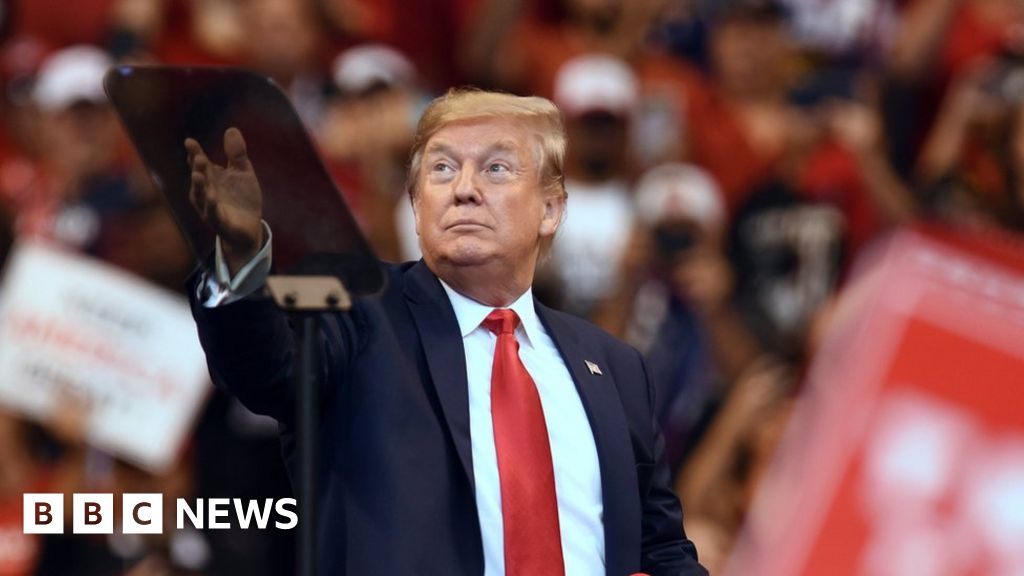
US President Donald Trump has said he will restore tariffs on steel and aluminium imports from Brazil and Argentina.
He justified the move saying those countries' weak currencies had made it harder for US food exports to compete.
"Brazil and Argentina have been presiding over a massive devaluation of their currencies, which is not good for our farmers," Mr Trump said.
Brazil's President Jair Bolsonaro said he would seek talks with Mr Trump.
"Their economy is not comparable with ours, it's many times bigger. I don't see this as retaliation," Mr Bolsonaro said in a radio interview with Brazil's Radio Itatiaia.
"I'm going to call him so that he doesn't penalise us. Our economy basically comes from commodities, it's what we've got," he said.
Key sector
Argentine production minister Dante Sica said he would also request a conversation with his US counterparts.
Despite Mr Trump's claims, both countries have taken steps over the past two years to try to bolster their currencies, which have dropped sharply amid domestic political turmoil and economic woes.
The plan to restore the tariffs, which Mr Trump announced on Twitter, came as a surprise.
While Mr Trump last year imposed 25% tariffs on foreign steel and aluminium, citing national security grounds, he later granted some exceptions after outcry abroad and in the US, where many manufacturers rely on foreign metal imports.
Argentina and Brazil, which agreed to limits on their metals exports, were among the countries to receive waivers.
The US is Brazil's biggest customer for steel and Brazil is the world's 10th biggest exporter of steel, according to the US Department of Commerce.
Steel accounts for 3.7% of the total goods Brazil exported in 2018.
For Mr Trump, farmers in rural states are an important block of voters, and they have had a difficult time in the past year.
Mr Trump's metals tariffs have sparked global retaliation, leading countries around the world to impose counter-tariffs on US goods, including farm exports.
The US also remains locked in a trade dispute with China over policies related to technology and government subsidies, prompting China to levy additional taxes on US farm exports, including soyabeans, cotton and dairy.
Across the country, farm bankruptcies surged 24% in the 12 months to October 2018, according to analysis by the American Farm Bureau Federation.
Meanwhile, Chinese buyers have looked to Brazil and Argentina as an alternative.
Analysis:
By Daniel Gallas, BBC South America business correspondent
Mr Trump accused Argentina and Brazil of "presiding over a massive devaluation" - with exports of both countries being now cheaper and more competitive due to the weak currency.
But Argentina and Brazil are not happy with the devaluation and both central banks have been intervening to prop up the sliding currencies.
Brazil's currency, the real, has reached an all-time low, as investors feel uncertain about sluggish economic recovery and the future reforms promised by the government.
In Argentina, investors are on the sidelines waiting for a new direction to the economy, which will be set by president-elect Alberto Fernandez when he takes office next week.
This crisis will be a test for Brazil's President Jair Bolsonaro, often called "Trump of the Tropics", who boasts a close relationship with his US counterpart.
https://news.google.com/__i/rss/rd/articles/CBMiKmh0dHBzOi8vd3d3LmJiYy5jb20vbmV3cy9idXNpbmVzcy01MDYzMzUwMNIBLmh0dHBzOi8vd3d3LmJiYy5jb20vbmV3cy9hbXAvYnVzaW5lc3MtNTA2MzM1MDA?oc=5
2019-12-02 17:14:40Z
52780455211231
Tidak ada komentar:
Posting Komentar